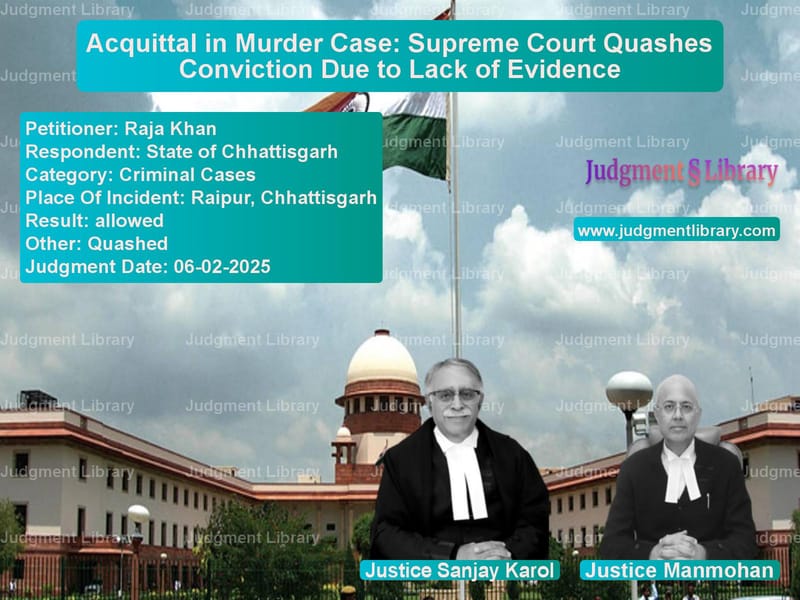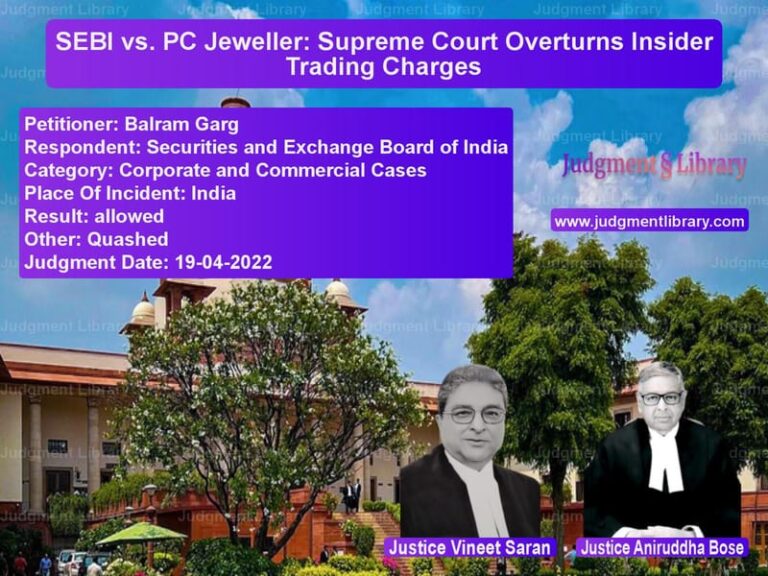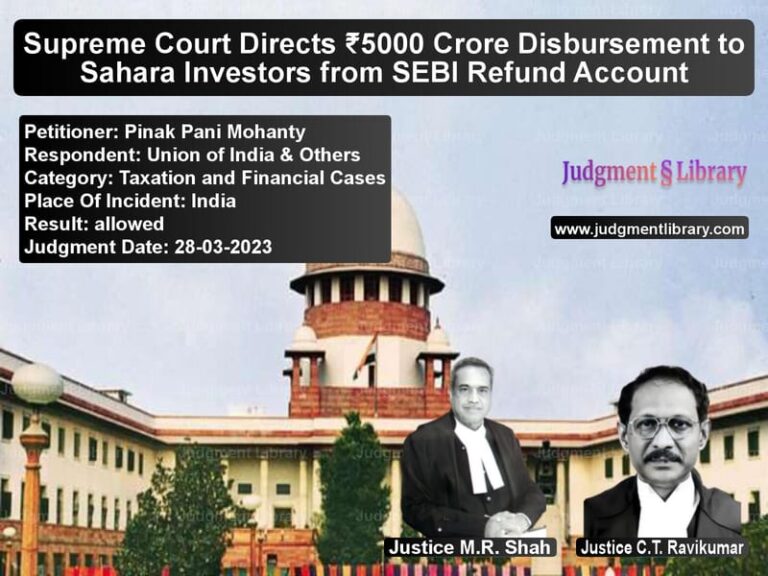Acquittal in Murder Case: Supreme Court Quashes Conviction Due to Lack of Evidence
The case of Raja Khan vs. State of Chhattisgarh is a significant ruling by the Supreme Court of India, where the accused was acquitted due to inconsistencies in evidence and procedural lapses. The judgment highlights the importance of proper investigation and adherence to legal principles in criminal cases.
The appellant, Raja Khan, was convicted by the trial court and the High Court of Chhattisgarh for the murder of Neeraj Yadav under Sections 302 and 201 of the Indian Penal Code (IPC). However, the Supreme Court overturned these convictions, citing unreliable evidence and procedural discrepancies.
Background of the Case
The case began with a missing person report filed by the deceased’s father on November 30, 2013, after Neeraj Yadav failed to return home. On December 1, 2013, a body was found floating in a quarry pond in Dondekala Matia, leading to an FIR being filed the next day. The body was identified by Balram Yadav, a cousin of the deceased.
Investigations revealed that the appellant, Raja Khan, had borrowed money from the deceased, leading to a financial dispute. The prosecution alleged that Raja Khan and co-accused Tarachand Verma lured the deceased into an auto, assaulted him with an iron pipe and a battleaxe (Gandasa), smashed his head with a stone, and disposed of the body in the pond.
Trial Court Proceedings
The prosecution presented the following key pieces of evidence:
- Testimonies of witnesses who claimed the deceased was last seen with the appellant.
- Recovery of the murder weapon and gold chains belonging to the deceased at the alleged instance of the appellant.
- Forensic evidence indicating human blood on the recovered stone.
Despite these claims, the trial court acquitted the co-accused, Tarachand Verma, but convicted Raja Khan based on circumstantial evidence. He was sentenced to life imprisonment for murder and five years for destruction of evidence.
High Court Proceedings
The appellant challenged the conviction before the High Court of Chhattisgarh, which upheld the trial court’s decision. The High Court reasoned that the appellant failed to provide a satisfactory explanation for the recovered gold chains and the blood-stained stone.
Arguments Before the Supreme Court
Appellant’s Arguments
Advocate Saubhagya Chauriha, representing the appellant, argued that:
- The recovery of incriminating materials was highly questionable.
- The prosecution failed to establish the appellant’s motive beyond a vague financial dispute.
- Witness testimonies were inconsistent regarding the last-seen theory.
- The appellant’s confession under Section 27 of the Evidence Act was fabricated.
Respondent’s Arguments
Senior Counsel Prafful Bharat, representing the State of Chhattisgarh, countered that:
- The recovered stone contained human blood, linking it to the crime.
- The gold chains belonging to the deceased were found at the appellant’s house.
- The last-seen theory was supported by credible witness testimony.
Supreme Court’s Analysis
The Supreme Court noted that the prosecution’s case was built entirely on circumstantial evidence. Citing the Sharad Birdhichand Sarda vs. State of Maharashtra precedent, the Court emphasized that the chain of evidence must be complete and exclude every possibility except the accused’s guilt.
The Court identified multiple inconsistencies in the prosecution’s case:
- The last-seen theory was not corroborated by independent witnesses.
- The recovery of weapons and gold chains was questionable, with no clear link to the accused.
- The forensic report did not conclusively prove that the blood on the recovered stone belonged to the deceased.
- The prosecution failed to establish a direct motive for the crime.
Verbal Arguments of the Court
In delivering the judgment, the Supreme Court made several key observations:
“When the entire case rests on circumstantial evidence, the prosecution must establish an unbroken chain of events leading to the accused’s guilt. Any missing link raises reasonable doubt.”
“The prosecution failed to prove that the recovered items were exclusively within the appellant’s knowledge or possession.”
“Witnesses contradicting each other on crucial aspects of the case significantly weaken the prosecution’s case.”
Final Judgment
Based on these findings, the Supreme Court ruled:
“The appeal is allowed. The impugned judgments and the conviction of the appellant under Sections 302 and 201 of IPC are hereby set aside. The respondent state is directed to release the appellant forthwith unless he is detained in another matter.”
This judgment underscores the judiciary’s commitment to ensuring that convictions are based on solid, incontrovertible evidence rather than conjecture and circumstantial gaps. It serves as a reminder that procedural lapses and weak evidence cannot be the basis for denying a person’s liberty.
Petitioner Name: Raja Khan.Respondent Name: State of Chhattisgarh.Judgment By: Justice Sanjay Karol, Justice Manmohan.Place Of Incident: Raipur, Chhattisgarh.Judgment Date: 06-02-2025.
Don’t miss out on the full details! Download the complete judgment in PDF format below and gain valuable insights instantly!
Download Judgment: raja-khan-vs-state-of-chhattisgar-supreme-court-of-india-judgment-dated-06-02-2025.pdf
Directly Download Judgment: Directly download this Judgment
See all petitions in Murder Cases
See all petitions in Bail and Anticipatory Bail
See all petitions in Fraud and Forgery
See all petitions in Contempt Of Court cases
See all petitions in Judgment by Sanjay Karol
See all petitions in Judgment by Manmohan
See all petitions in allowed
See all petitions in Quashed
See all petitions in supreme court of India judgments February 2025
See all petitions in 2025 judgments
See all posts in Criminal Cases Category
See all allowed petitions in Criminal Cases Category
See all Dismissed petitions in Criminal Cases Category
See all partially allowed petitions in Criminal Cases Category







